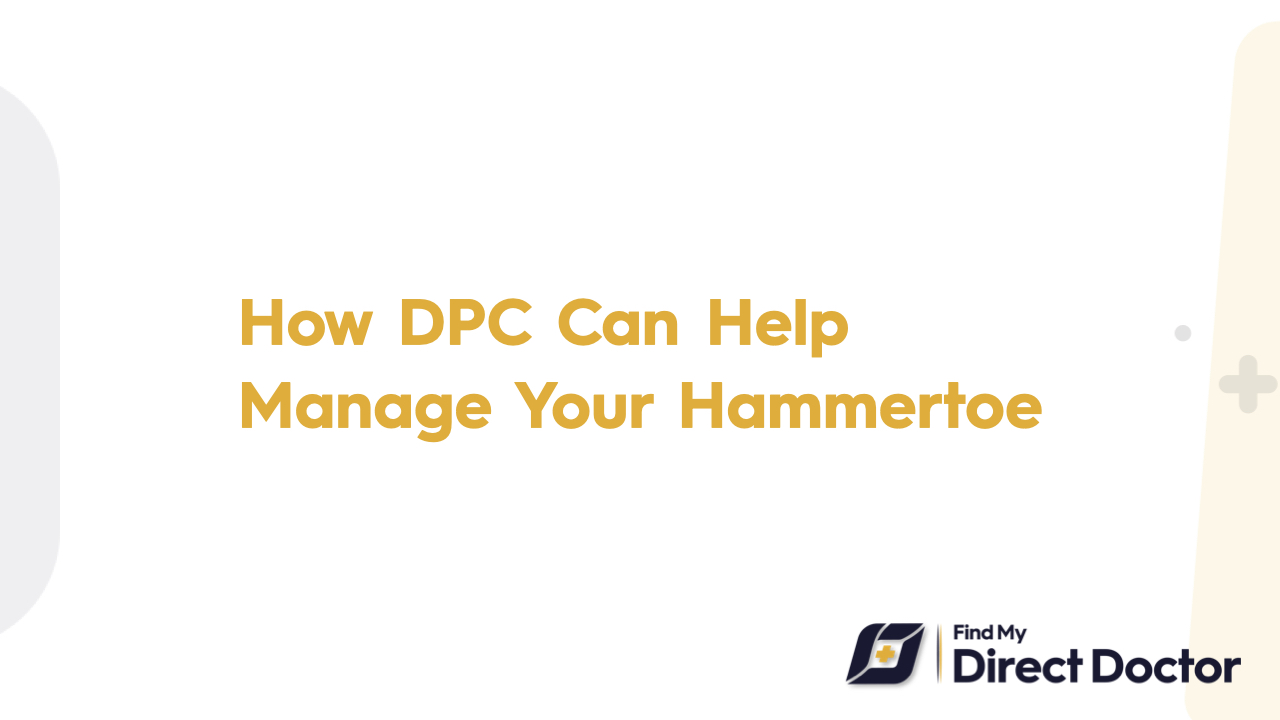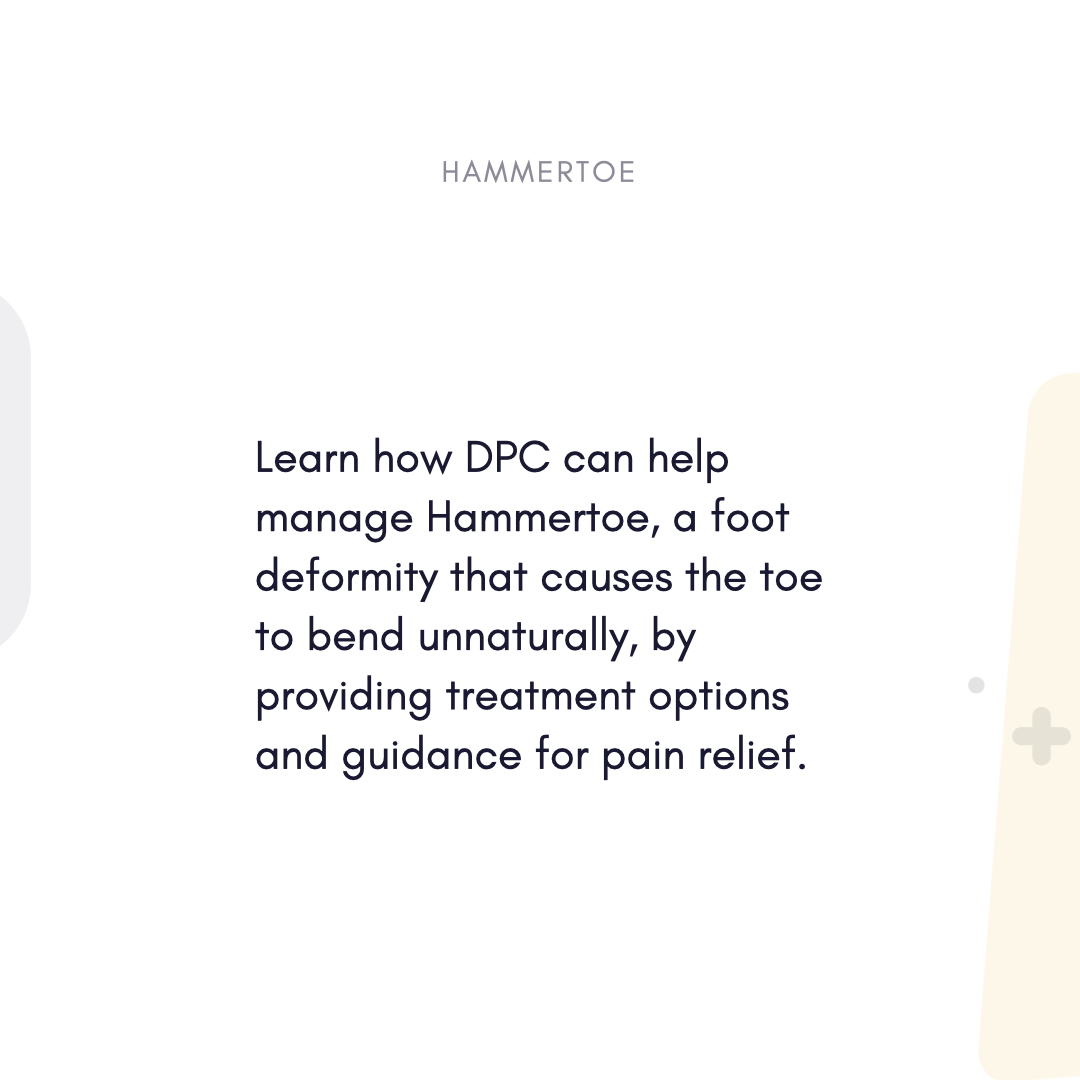Hammertoe and Direct Primary Care (DPC): Stepping into Personalized, Affordable Relief
Common foot deformity hammertoe causes pain, corns, and trouble wearing shoes since toes bend unusually at the middle joint. Mild cases can be controlled sensibly; severe cases might call for surgery. A membership-based healthcare model with flat monthly rates, Direct Primary Care (DPC) provides patient-centered care stressing early intervention, customized treatments, and flawless coordination with specialists.
- Causes: Tight shoes, arthritis, diabetes, or muscle imbalances.
- Symptoms:
- Bent toe, joint pain or corns.
- Stiffness, trouble walking.
- Stages:
- Flexible: One can manually straighten toe.
- Rigid: Fixed joint needing advanced treatment.

How DPC Improves Hammertoe Care
DPC Improves Hammertoe Control
-
Early Intervention and Conservative Treatment:
- Early foot assessments, especially in high-risk patients (such as diabetics), help identify abnormalities.
- Non-Surgical Remedies:
- Orthotics and padding to distribute pressure with over-the-counter or custom devices.
- Suggest wide-toe box shoes to minimize irritation (per American College of Foot and Ankle Surgeons recommendations).
- Teach stretches to increase flexibility and strengthen foot muscles in order to toes.
-
Specialist Coordination:
- Referrals for podiatry: Schedule quick visits for custom orthotics or corticosteroid injections.
- Work with orthopedic surgeons to plan tendon release or joint fusion as necessary.
-
Avoidance of Complications:
- For patients with neuropathy, routine foot exams help prevent ulcers and infections.
- Lifestyle changes: Activity and weight control to lower pressure on the toes.
Key Benefits of DPC for Hammertoe Patients
-
Improved Continuity and Accessibility:
- Same-day appointments: Treat corns, skin breakdown, or unexpected pain right away.
- Regular follow-ups allow you to track development and modify treatments before problems worsen.
-
Affordable, Transparent Treatment:
- Flat monthly fees (USD 50–150) cover exams, basic orthotics, and care coordination—no hidden charges.
- Early, consistent treatment helps prevent expensive surgeries or infections.
-
Patient-Centered Education:
- Teach proper footwear, toe exercises, and corn/callous care in self-management training.
- Support for chronic conditions: Combine diabetes or arthritis control with hammertoe treatment.
DPC Customized Hammertoe Management
- Non-Surgical Focus:
- Custom solutions obtained by either in-house adjustments or podiatrist collaboration on tailored orthotics.
- Designed routines for athletes, seniors, or sedentary patients to slow progression.
- Coordinate imaging (X-rays) and inform patients on recovery times pre-operatively.
- Post-Operative Care:
- Track wound healing and suggest rehabilitative activities to stop recurrence.
- Holistic Foot Health:
- Work with nearby stores to negotiate discounts on supportive shoes.
- Weight and nutrition coaching: By means of eco-friendly lifestyle modifications, lower pressure on feet.
Real-World Success Story
- Case 1: Carlos's DPC provider prescribed silicone toe pads and orthotics to alleviate pain after years of narrow shoes caused rigid hammertoe.
- For regular cortisone injections, worked with a podiatrist.
- Helped him choose diabetic-friendly shoes after diagnosis.
- Carlos avoided surgery and today walks pain-free.
Frequently Asked Questions About DPC and Hammertoe
- Q: Is DPC able to create custom orthotics?
- A: DPC provides OTC options and internal adjustments but works with podiatrists for custom devices.
- Q: How does DPC treat diabetic hammertoe?
- A: Frequent foot exams, urgent treatment for ulcers, and neuropathy tests help avoid complications.
- Q: Are foot exercises beneficial?
- A: Certainly! DPC offers tracks of progress and illustrated guides for follow-up.
- Q: Can hammertoe return following surgery?
- A: DPC emphasizes exercises and post-operative shoes to reduce recurrence.
How DPC Specifically Helps Hammertoe Patients
- Timely Specialist Access: Skip podiatry or orthopedic referral delays.
- Early Conservative Treatment: Lowers risk of surgery.
- Education-Driven Care: Patients learn to control daily symptoms, enhancing long-term results.
- Transparent Pricing: Releases money for orthotics or quality shoes.
Take Control of Your Foot Health Right Now
Hammertoe need not ruin your life on the sidelines. DPC helps you find a partner who keeps you comfortably moving by combining knowledge, accessibility, and empathy. All set to confidently manage hammertoe? Look for a DPC provider close by and enjoy proactive care as discreet as it is.






